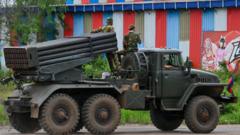After five days of intense fighting that has resulted in numerous casualties and displacement, Thailand and Cambodia have agreed to an immediate ceasefire to restore peace and security in the region.
Thailand and Cambodia Reach Immediate Ceasefire Agreement Amidst Ongoing Border Conflict

Thailand and Cambodia Reach Immediate Ceasefire Agreement Amidst Ongoing Border Conflict
Anwar Ibrahim announces a ceasefire to end deadly clashes at the Thai-Cambodian border.
In a significant diplomatic breakthrough, Thai and Cambodian leaders have consented to halt hostilities as of midnight following a series of violent confrontations over their long-standing border dispute. The resolution was announced by Malaysian Prime Minister Anwar Ibrahim during a news conference held with his counterparts Phumtham Wechayachai of Thailand and Hun Manet of Cambodia. This development comes in the wake of approximately 33 fatalities and thousands of people being forced from their homes due to the conflict.
The crisis escalated significantly after a recent clash resulted in the death of a Cambodian soldier, raising tensions along the border in May. On the backdrop of growing violence, Thailand took measures to restrict its citizens and tourists from entering Cambodia, while Cambodia countered with import bans of its own on several Thai goods. The situation deteriorated further with the injury of a Thai soldier from a landmine explosion, leading to closures of border points and the expulsion of diplomats from both sides.
Reports indicate that casualties have included civilians, with communities across the border facing the brunt of artillery attacks. As the ceasefire was brokered, fighting continued but both nations are now poised to take steps towards troop withdrawal, aided by ASEAN members monitoring the situation.
As the fear among the local populace persists, with many expressing their longing for a resolution to the conflict, the agreed ceasefire marks a crucial first step in the ongoing efforts for peace between Thailand and Cambodia. The impact of the fighting has been severely felt, with as many as 140,000 civilians displaced from their homes on the Thai side and significant evacuations reported in Cambodia as well.
With international stakeholders, including representatives from the US and China participating in the mediation process, the commitment to ceasefire serves as a key element in the complex landscape of regional politics and trade negotiations, as both countries seek to maintain favorable relations with global powers.
The crisis escalated significantly after a recent clash resulted in the death of a Cambodian soldier, raising tensions along the border in May. On the backdrop of growing violence, Thailand took measures to restrict its citizens and tourists from entering Cambodia, while Cambodia countered with import bans of its own on several Thai goods. The situation deteriorated further with the injury of a Thai soldier from a landmine explosion, leading to closures of border points and the expulsion of diplomats from both sides.
Reports indicate that casualties have included civilians, with communities across the border facing the brunt of artillery attacks. As the ceasefire was brokered, fighting continued but both nations are now poised to take steps towards troop withdrawal, aided by ASEAN members monitoring the situation.
As the fear among the local populace persists, with many expressing their longing for a resolution to the conflict, the agreed ceasefire marks a crucial first step in the ongoing efforts for peace between Thailand and Cambodia. The impact of the fighting has been severely felt, with as many as 140,000 civilians displaced from their homes on the Thai side and significant evacuations reported in Cambodia as well.
With international stakeholders, including representatives from the US and China participating in the mediation process, the commitment to ceasefire serves as a key element in the complex landscape of regional politics and trade negotiations, as both countries seek to maintain favorable relations with global powers.



















